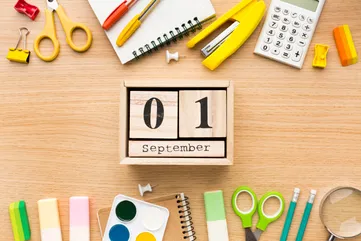Time Awareness
Time awareness is the ability to accurately perceive how much time has passed, estimate task duration, and understand time-related concepts for planning and scheduling.
You're not alone
If your teen genuinely believes they can shower, dress, eat breakfast, and drive to school in ten minutes, or if "five more minutes" of gaming turns into two hours, you're witnessing typical time awareness challenges. Research shows teens' time perception can be off by 40 percent or more. This improves with brain maturation and practice. Many successful adults compensate for weak time awareness with tools and strategies.
What it looks like day to day
Student
Your teen starts a project at 10 PM honestly believing they can finish the three-hour assignment before bed.
Parent
You say "we leave in 30 minutes" and find your teen just starting to get ready when it's time to go.
Tiny steps to try
- 1
Time tracking exercise
Have your teen guess task duration, then time it. Compare estimates to reality without judgment.
- 2
Analog clocks
Place analog clocks in visible locations. Seeing time as space improves awareness.
- 3
Time announcements
Regularly state the time and remaining time. "It's 7:15, 45 minutes until we leave."
- 4
Buffer time teaching
Add 50 percent to all time estimates. If they think it takes 20 minutes, plan for 30.
- 5
Time-based rewards
Connect activities to actual time. "When you've worked for 30 real minutes, measured by this timer, then screen time."
Why time awareness eludes teens
The brain regions responsible for time perception continue developing through the mid-twenties, making time awareness genuinely difficult for teens.
Time awareness challenges:
• Losing hours to "quick" social media checks
• Consistently underestimating homework time
• Always running late despite trying
• Surprise when deadlines "suddenly" arrive
• Difficulty prioritizing based on time constraints
• Feeling like time moves differently when engaged versus bored
Poor time awareness isn't carelessness but neurological development.
References
Barkley, R. A. (2012). Executive functions: What they are, how they work, and why they evolved. Guilford Press.
Ready to help your teen thrive?
Get personalized 1-on-1 coaching to build better habits and boost grades. Join 10,000+ families who trust Coachbit.
Frequently Asked Questions
Is poor time awareness related to ADHD?
Yes, time blindness is a core ADHD feature, but many non-ADHD teens also struggle with time awareness. ADHD brains process time differently, experiencing "now" and "not now" rather than gradual time flow. However, stress, anxiety, and normal development also affect time perception. Focus on building skills regardless of diagnosis.
Will my teen always struggle with time?
Time awareness improves with brain maturation and practice. Many adults who struggled as teens develop excellent compensatory strategies. External tools like timers, alarms, and calendars become permanent supports rather than crutches. The goal isn't perfect internal time awareness but functional time management using appropriate tools.
Related Terms
Executive Function
Executive function is your brain's management system that helps teens plan, focus, remember instructions, and juggle multiple tasks successfully.
Planning
Planning is the ability to create structured approaches for achieving goals by breaking them into steps, estimating time, and sequencing actions effectively.
Time Blindness
Time blindness is when your teen's brain doesn't sense time passing normally, making them genuinely unable to estimate how long things take or how much time has passed.
Time Estimation
Time estimation is the ability to predict how long tasks will take to complete, essential for planning, scheduling, and meeting deadlines effectively.
Time Management
Time management is the ability to plan, prioritize, and use time effectively to accomplish tasks and meet deadlines without constant crisis.
Related Articles

Finding Order in the Chaos – Setting up Calendars for Kids
Creating a calendar and daily schedule for kids can be beneficial to manage school, homework, extracurriculars and hobbies. Color-coding and time-blocking are helpful tools for kids with ADHD.
Read article
3 Ways an Executive Functioning Coach Can Help Your Child
Discover why executive functioning skills are crucial for your child's success. Learn how an executive functioning coach can make a difference
Read article
